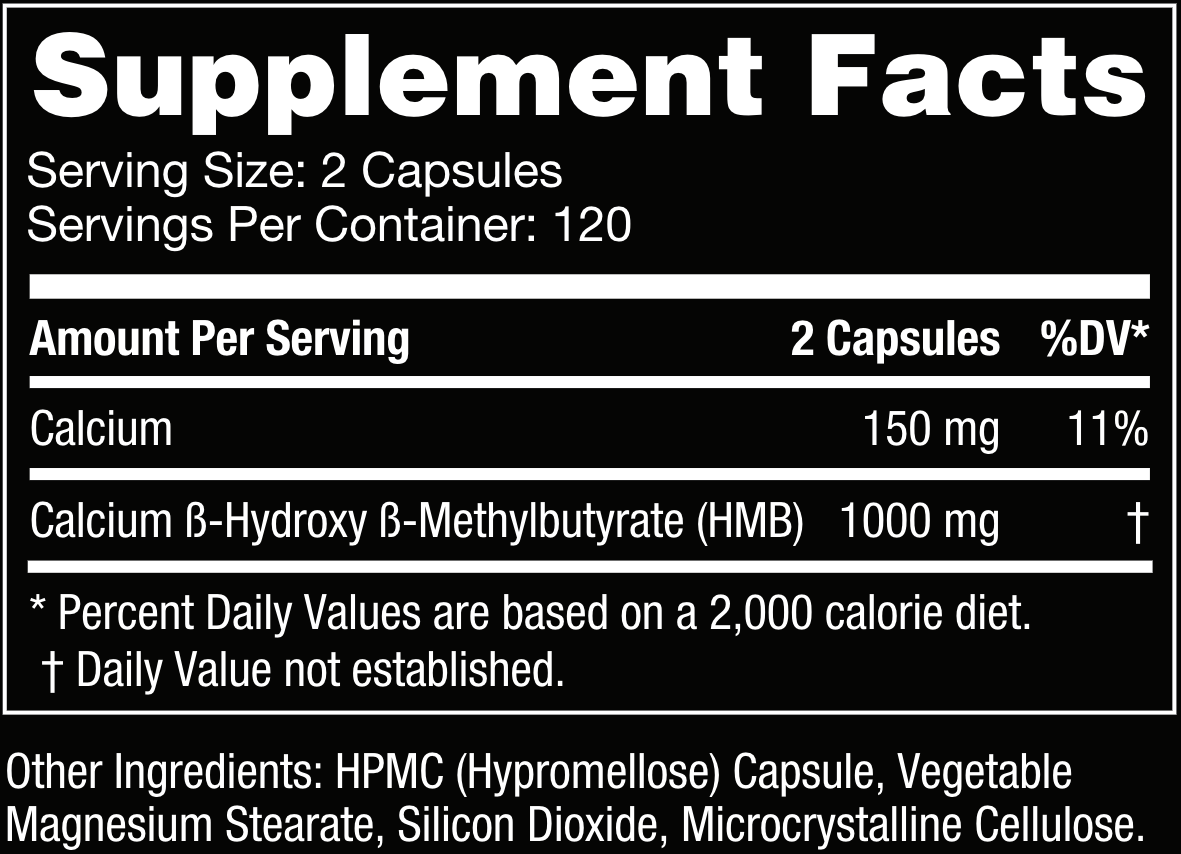HMB
β-Hydroxy-β-Methylbutyrate








- Potent Anti-Catabolic* (Reduce Muscle Breakdown) [R, R, R]
- Upregulates Anabolic Signaling* (Increase Muscle Protein Synthesis) [R, R, R]
- Reduces DOMS* (Delayed Onset Muscle Soreness) [R, R]
- Enhances Recovery* [R]
Introducing Gorilla™ HMB – our β-Hydroxy-β-Methylbutyrate (HMB) formula. HMB is an isolated metabolite of the protein synthesis-activating essential amino acid leucine [R].
The primary utility of HMB in the body is to inhibit the catabolism of muscle tissue [R].
HMB VS. LEUCINE
Gram for gram, literature suggests that HMB is 20x more potent than Leucine at inhibiting muscle breakdown [R, R].
1-3 grams of HMB is seen as equivalent to 20–60g of leucine supplementation for this purpose [R, R].
An individual would need to consume over 600 g of high quality protein to obtain the amount of leucine (60 grams) necessary to produce the typical 3 g daily dosage of HMB used in human studies [R].
This doesn’t mean throw your EAA’s in the garbage and start pounding HMB, they each may have their own individual use case.
For the purpose of muscle protein synthesis, HMB and leucine are fairly equivalent, but in the context of attenuating muscle loss, that’s where HMB appears to shine in its application [R].
HOW DOES IT WORK?
HMB has been shown to result in a net positive balance of skeletal muscle protein turnover partly through stimulation of protein synthesis, but primarily via the attenuation of protein degradation [R, R, R].
WHEN DOES IT MAKE SENSE TO SUPPLEMENT HMB?
HMB excels during times when the risk of muscle catabolism is elevated [R].
This can include bodybuilding prep, low protein diets, general caloric restriction, high-intensity training, aging, high stress, fasting, periods of bed rest, illness, injuries, etc. [R].
Literature suggests that HMB may attenuate muscle loss and exercise-induced muscle damage (e.g. DOMS & damage from high-intensity training) while also augmenting muscle protein synthesis, strength, and body composition [R, R, R].
If you are young, already consume enough protein, and are a well-trained individual, the benefits of HMB will likely be less pronounced, and it may not be useful altogether [R, R, R].
For older individuals with elevated anabolic resistance, or those subjecting themselves to one, or several of the aforementioned catabolic environments, HMB may be a useful tool to maintain a net positive balance of protein turnover, reduce markers of muscle damage, and preserve hard-earned muscle mass [R, R].

Consuming this product can expose you to chemicals including lead and mercury which are known to the State of California to cause cancer and birth defects or other reproductive harm. For more information go to www.P65Warnings.ca.gov/food.
Third Party Testing
We prioritize ingredient transparency, ensuring that our customers have complete access to information about the ingredients in our products, empowering them to make informed choices about their health and wellness.
The primary purpose of third party testing is to verify the identity, potency, purity, and composition of the supplement. It serves as an official record that the product has undergone rigorous testing and meets specific criteria set forth by regulatory authorities or industry standards.




